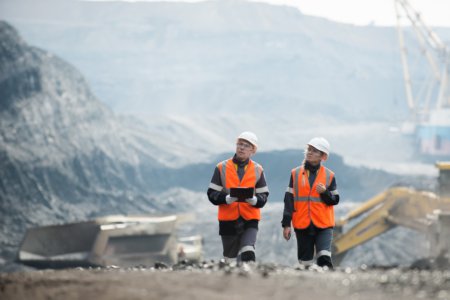
The world needs more energy, more water, and more minerals, but these are getting harder to find. In 2024, global energy use jumped by 2.2%, well above the average growth rate over the past decade. Water demand is expected to rise by as much as 25% by 2050; however, the world could face a 40% shortage in freshwater by 2030.
The good news is that geoscientists are working to change this. Whether it’s spending a summer in Antarctica tracking ice sheets or studying the lithosphere, their work is shaping a more sustainable planet. You can be part of this mission too. With a degree in geological and mining engineering from one of these four universities, you’ll join a community determined to safeguard our shared future:

At Colorado School of Mines Geology and Geological Engineering, you can get your hands dirty in the field, dive into research, build computer models, or a hybrid of all three to create your own unique path. Source: Colorado School of Mines
Colorado School of Mines
Some places simply feel built for explorers. Golden, Colorado, is one of them. A small but vibrant town just a short drive from Denver, it’s here that the Colorado School of Mines’s Department of Geology and Geological Engineering has grown into one of the premier institutions in applied geoscience.
What makes studying geology and geological engineering at Mines so unique? For one, it integrates concepts from chemistry, physics, and related sciences. Add Colorado’s mountains into the mix as your outdoor laboratory, and you’ll get real-world field and research experiences that prepare you to become sustainable innovators, experts, and entrepreneurs. It’s an outcome ranked third in the US for return on investment, according to a national study published this year.
The Master of Engineering (Non-Thesis) Programme in Geological Engineering, with 24 hours of coursework and six hours of independent study, is one example of a programme with long-term value. You can customise your programme through various electives: Applied Numerical Modelling for Geomechanics, Geological Engineering Site Investigation, Landslides: Investigation, Analysis & Mitigation, and many more. The programme helps you understand how the Earth works — knowledge that can lead to a wide range of career opportunities.
To make learning more flexible, Mines offers online programmes as well. The Graduate Program in Geographic Information Systems (GIS) and Geoinformatics, for instance, is a graduate certificate and a non-thesis Master of Science degree. With its interdisciplinary teaching model, it provides practical training in geospatial technologies, remote sensing, and advanced quantitative analysis. You will graduate with the expertise to become leading geographers, cartographers, geomatics software engineers, and more, or use the credits earned towards a master’s degree to take your education even further. Explore GGE’s graduate programmes and see what’s possible.

AGH University of Krakow is one of the top technical universities in Poland, founded in 1913. Source: AGH University of Krakow
AGH University of Krakow
Krakow: the second largest city, and one of the oldest in Poland, located along the Vistula River in the Małopolska Province. It’s a vibrant, cultural, and artistic hotspot that’s well-connected to the rest of Europe. It’s long been known as a city of students, and is home to the AGH University of Krakow — a leading institution for modern technology.
The Faculty of Geology, Geophysics and Environmental Protection started as three separate departments in the Mining Academy, only to see incorporation into the then-Faculty of Geology and Surveying after the second world war. Since then, it’s grown into the largest faculty of professors and postdoctoral fellows in Earth Sciences across European universities. It trains engineers in geology and applied geophysics to excel at research and become graduates in demand by industrial plants, research institutions, tourist agencies, and more.
The Applied Geology: Earth and Extraterrestrial Materials master’s programme spans three semesters and is designed to cater to the contemporary needs of the world. Curriculum covers topics across geology, modern material technologies derived from raw materials, and the laws and mechanisms of nature. It’s practical, allowing you to conduct field activities. Other programmes include Applied Geology: Economic Geology, Applied Geophysics, Mining geology, and more.

The Department of Earth, Ocean and Atmospheric Sciences offers over 10 master’s, doctoral, and certificate programmes. Source: University of British Columbia
University of British Columbia
The best part about studying geology in Vancouver is that you have a natural living laboratory right at your doorstep. The best part about studying geology at the University of British Columbia in Vancouver is that you have access to one of the world’s top-ranked universities in environmental sciences, and connections to 1,200 mineral exploration companies.
That’s far from the only draw. At the Department of Earth, Ocean and Atmospheric Sciences, you will be part of a diverse community of faculty and students who stand at the forefront of cutting-edge research to answer the world’s most pressing issues. Hands-on learning experiences make the heart of the UBC experience, with opportunities to engage with laboratory-based research, cutting-edge computing, data science, industry professionals and policymakers, and more.
There are various programmes to choose from, depending on your goals. If you’re looking for a unique blend of geotechnical engineering, hydrogeology, and applied geology, the MASc in Geological Engineering is offered for a more research-intensive option, while the MEng in Geological Engineering is more course-based, and focused on professional development. You can also pursue the MSc in Geological Sciences for an in-depth study of the Earth, its materials, structure, processes, and history.

The University of Queensland is the top-ranked institution for environmental sciences in Australia. Source: University of Queensland
University of Queensland
Most students at the University of Queensland (UQ) are stationed on the St. Lucia campus. It’s situated on 114 hectares of Brisbane River-bound land, where you’ll find cutting-edge research facilities beyond the historic sandstone architecture in the Great Court.
As a student in the School of the Environment, you’ll also be close to an extraordinary natural landscape, which is perfect for conducting fieldwork. The field courses at UQ are forward-thinking, and nationally acclaimed. Students have conducted geological mapping in the Mount Isa region and even investigated the coral reefs on the Great Barrier Reef.
UQ ranks #1 in Australia for environmental sciences, and #1 for geography in Queensland according to the QS World University Rankings 2025 — and it’s easy to see why. The Master of Geographic Information Science allows you to develop the geospatial data skills to enter a diverse range of careers, including ecology, cartography, environmental science, and more.
You have the option to complete the programme in a year and a half, or two years. Learning is practical, allowing you to undertake hands-on projects in specialist laboratories with the latest equipment. As part of the curriculum, you’ll complete a semester-long research project in geographic information science and or remote-sensing.
*Some of the institutions featured in this article are commercial partners of Study International









